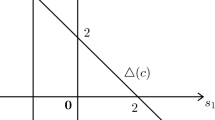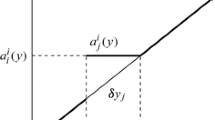Abstract
Some bargaining solutions may remain unchanged under any extension of a bargaining set which does not affect the utopia point, despite the fact that there is room to improve the utility of at least one agent. We call this phenomenon the stagnation effect. A bargaining solution satisfies stagnation proofness if it does not suffer from the stagnation effect. We show that stagnation proofness is compatible with the restricted version of strong monotonicity (Thomson and Myerson in Int J Game Theory 9(1):37–49, 1980), weak Pareto optimality, and scale invariance. The four axioms together characterize the family of the bargaining solutions generated by strictly-increasing paths ending at the utopia point (SIPUP-solutions).


Similar content being viewed by others
Notes
The axioms of strong and weak Pareto optimality are formally defined in Sect. 1.
See Thomson (1994) for a review of the main bargaining solutions in this literature.
The basic mathematical notation is as follows: Let \(\{Y_i\}_{i\in I}\) be a family of sets \(Y_i\) indexed by I. We denote by \(y_J\) the projection of y onto \(Y^J\). If \(x,y \in \mathbb {R}^{I}\), then \(x\ge y \) means that, for each \(i \in I\), \(x_i\ge y_i\), analogously, \(x> y\) means that for each \(i \in I\), \(x_i> y_i\).
We refer to this class of problems as the canonical bargaining problems.
References
Alós-Ferrer C, García-Segarra J, Ginés-Vilar M (2017) Anchoring on Utopia: a generalization of the Kalai–Smorodinsky solution. Economic Theory Bulletin forthcoming
Chun Y, Peters HJH (1989) Lexicographic monotone path solutions. Op Res Spektrum 11(1):43–47
Driesen B (2016) Truncated leximin solutions. Math Soc Sci 83:79–87
Dubra J (2001) An asymmetric Kalai–Smorodinsky solution. Econ Lett 73(2):131–136
García-Segarra J, Ginés-Vilar M (2015) The impossibility of paretian monotonic solutions: a strengthening of Roth’s result. Op Res Lett 43(5):476–478
Herrero C (1998) Endougenous reference point and the adjusted proportional solution for bargaining problems with claims. Soc Choice Welf 15(1):113–119
Herrero C, Marco MC (1993) Rational equal-loss solutions for bargaining problems. Math Soc Sci 26(3):273–286
Imai H (1983) Individual monotonicity and lexicographic maxmin solution. Econometrica 51(2):389–401
Kalai E (1977) Proportional solutions to bargaining situations: interpersonal utility comparisons. Econometrica 45(7):1623–1630
Kalai E, Smorodinsky M (1975) Other solutions to Nash’s bargaining problem. Econometrica 43(3):513–518
Nash JF (1950) The bargaining problem. Econometrica 18(2):155–162
Peters HJH, Tijs SH (1984) Individually monotonic bargaining solutions of \(n\)-person bargaining games. Method Op Res 51:377–384
Peters HJH, Tijs SH (1985) Characterization of all individually monotonic bargaining solutions. Int J Game Theory 14(4):219–228
Rosenthal RW (1976) An arbitration model for normal-form games. Math Op Res 1(1):82–88
Salonen H (1987) Partially monotonic bargaining solutions. Soc Choice Welf 4(1):1–8
Thomson W (1994) Cooperative models of bargaining. In: Aumann RJ, Hart S (eds) Handbook of game theory with economic applications, vol 2. Elsevier, Amsterdam, pp 1237–1284
Thomson W, Myerson RB (1980) Monotonicity and independence axioms. Int J Game Theory 9(1):37–49
Author information
Authors and Affiliations
Corresponding author
Additional information
We are grateful to Carlos Alós-Ferrer, Carmen Herrero, J. Vte. Guinot, M.Carmen Marco, Hervé Moulin, Hans Peters, Hannu Salonen, William Thomson, and two anonymous referees for their useful comments. Financial support from projects ECO2015-68469-R Ministerio de Educación and PREDOC/2007/28 Fundación Bancaja, E-2011-27 Pla de Promoció de la Investigació de la UJI, P1-1B/2015/48 are gratefully acknowledged.
Rights and permissions
About this article
Cite this article
García-Segarra, J., Ginés-Vilar, M. Stagnation proofness in n-agent bargaining problems. J Econ Interact Coord 14, 215–224 (2019). https://doi.org/10.1007/s11403-017-0212-5
Received:
Accepted:
Published:
Issue Date:
DOI: https://doi.org/10.1007/s11403-017-0212-5




